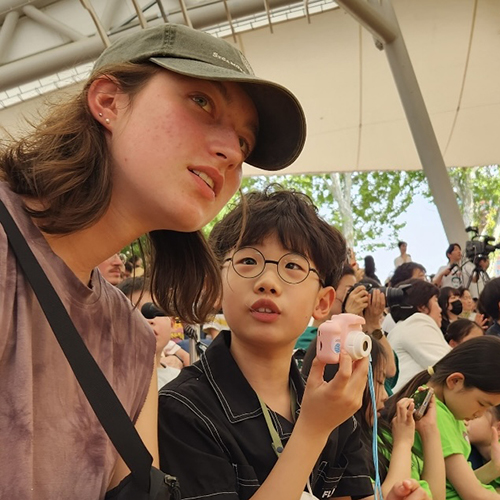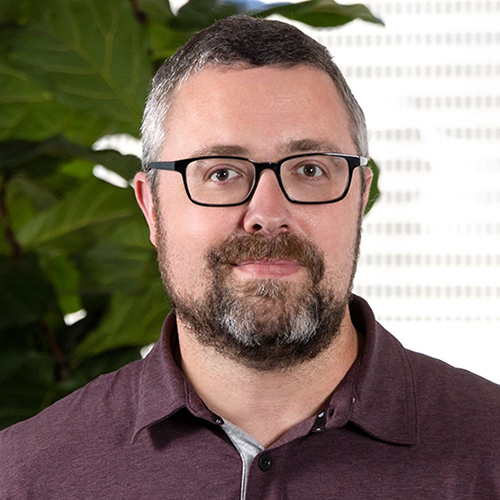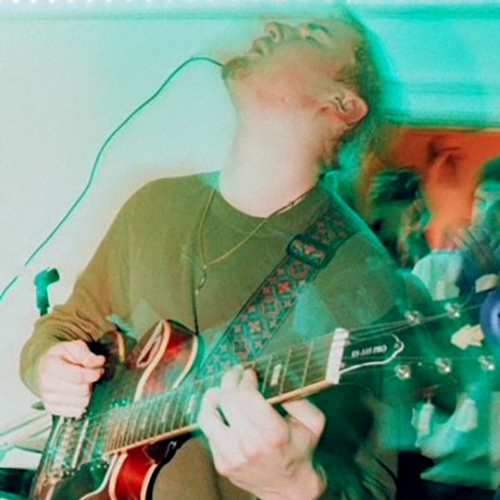It’s one thing for a stand-up comedian to bomb on stage. It’s quite another to hear actual bombs exploding while on stage. Drake Witham (‘96) has experienced both.

Witham, who earned a B.A. from the UW in communication and political science, was touring Iraq with Comics on Duty—a group that sends comedians to military bases to entertain U.S. troops— when a bomb exploded near the army base where he was performing. Although Witham was a bit shaken, he continued his stand-up routine, earning rousing applause from the soldiers.
A few years earlier, reporting on the troops would have seemed more likely than entertaining them.
“I always wanted to be a journalist,” says Witham, son of Barry Witham, UW professor of drama. When Drake arrived at the UW as a freshman, he joined the staff of The Daily, the UW student newspaper. He later served as editor. “I was at The Daily all the time,” Witham recalls. “I would drop courses to spend more time there.”
After graduating and completing several newspaper internships, including one with the Seattle Post-Intelligencer, Witham took a job at the Providence Journal in Rhode Island. That’s when he first attended open mic night at a club in Boston. Watching other amateurs perform stand-up comedy, he decided to give it a try.
“You see people just dying during their five minutes on stage,” recalls Witham.
“I thought, ‘I can do that.’ Most of it is having the guts to get up and fail. Because you do fail most of the time.”
The first time Witham got on stage, he was a hit. But his success was short-lived. The next few times, he struggled to get a response from the audience. “It’s like the audience can sense it when you’re on stage for the first time,” he says, “and they give you a free pass. After that you’re on your own.”
After two years in Rhode Island and numerous visits to open mic night in Boston, Witham took a job at the Dallas Morning News, where he was assigned to the night police beat. “I spent two years covering murder and mayhem,” Witham recalls. “Any time I’d talk to somebody for a story, it was the worst day of their life. It was the opposite of stand-up comedy.”
Although there was no place for comedy in his newspaper reporting, the Dallas Morning News did, in a sense, launch Witham’s comedy career. Colleagues at the paper knew that he had some stand-up experience and asked him to perform at an office Christmas party. With about 200 reporters, editors, and other staff in attendance, Witham spun jokes about the paper and did impressions of the editors. “I did great,” Witham recalls. “I killed. After that, I decided to plan my escape. I decided that stand-up was what I wanted to do.”

Witham moved to Los Angeles immediately. He soon discovered that “a few other people had the same idea.” He crawled his way up the comedy ladder, taking jobs that still make him cringe. Particularly memorable was the gig in a laundromat, where “there were 40 people in the room, only half of them spoke English, and no one was laughing.” Still, says Witham, even awful jobs provide an opportunity to perform.
There’s only one way to do comedy, and that’s to practice in front of people,” he says.
All that practice paid off. A year after committing to a comedy career, Witham competed in—and won—the Seattle Comedy Competition in 2003. “I was so new at the time that I didn’t really know what I was doing,” he admits. “In the finals, I had to have 20 minutes of material. I didn’t have 20 minutes of material. I had to fake my way through it.”
Even with that early success, Witham says that only recently has he become comfortable enough to make eye contact with audience members. “To look at somebody while on stage, that was an uncomfortable thing for me,” he says. “Now that I’m more experienced, I’m able to treat it as a conversation with multiple people.”
Witham’s resume includes appearances on Comedy Central’s Live at Gotham and The Late Late Show with Craig Ferguson. Yet even now some performances are more successful than others. That, says Witham, is the beauty and challenge of stand-up. Even if you do the same material, the show is different every time,” he says.
Some shows in Iraq have been really different. Witham, whose brother was in the military from 1991 through 2002, wasn’t sure what to expect when he signed on with Comics on Duty. His first Iraq trip was a ten-day tour with five other comics, during which that bomb exploded nearby while he was on stage. Undaunted, Witham rejoined the comedy tour in 2006—one month after getting married—and spent a harrowing night in a Baghdad bunker with U.S. soldiers after mortar hit the army base’s ammunitions supply just as a comedy show ended. “We grabbed our helmets and headed for the bunker,” says Witham. “The ammunition continued blowing up for hours. I thought, ‘What am I doing here?’”
Witham toured with Comics on Duty again this year but skipped Baghdad, much to his wife’s relief. He visited bases in Europe and the Mediterranean instead. And closer to home, he performed in the Northwest in September, including a gig at the Bumbershoot Festival in Seattle.
For the UW alumnus, performing in Seattle is always a treat. “I love it up here,” he says. “The crowds are smarter. It’s here that I won the comedy competition when I was so new to comedy. Seattle has been good to me.”
For more about Drake Witham, visit his website at www.drakewitham.com.
More Stories

Finding Family in Korea Through Language & Plants
Through her love of languages and plants — and some serendipity — UW junior Katie Ruesink connected with a Korean family while studying in Seoul.

Working Toward Responsible AI
Artificial intelligence (AI) is an essential tool at Indeed, a global job-matching and hiring platform. Trey Causey (2009) works to ensure that the company's AI promotes equity and fairness.

Celebrating Contemporary Indigenous Music
Markus Teuton, a musician and citizen of Cherokee Nation, explores contemporary Indigenous music through his academic work and as host of “Indigenous Jazz,” a radio show.